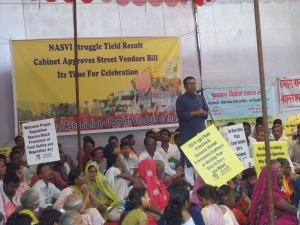NASVI urges all political parties to support the Bill in the current session of Parliament
New Delhi, 18 August: The much awaited central law to protect the livelihood and social security rights of more than 10 million street vendors would soon be a reality with the Union Cabinet approving the Street Vendors (Protection of Livelihood and Regulation of Street Vending) Bill, 2012. The Bill would now be placed in the Parliament for e nactment.
nactment.
The National Association of Street Vendors of India (NASVI) which has long been campaigning for such a central law on Saturday hailed the Union Cabinet for giving nod to the street vendors bill and hoped that the Parliament would pass the bill in its current session.
Hailing the Cabinet approval, NASVI national coordinator Arbind Singh said, “The street vendors’ struggle has yielded result. We have reached a major milestone. Once enacted, the Street Vendors Law would go a long way in protecting the livelihood, dignity and human rights of millions of street vendors. We call upon all political parties to support the Bill in the Parliament.”
He said,” We have been struggling for a comprehensive central law in favour of street vendors since 2009. In October, 2010, the Supreme Court verdict also justified our demand and the government was directed to convert the National Policy for Urban Street Vendors into a law as the policy has not been able to ensure the fundamental right to livelihood of street vendors. Post- Supreme Court verdict, the street vendors indeed struggled a lot to get Ministry of Housing and Urban Poverty Alleviation convinced on the critical necessity of central law.”
“We organized vendors to come on to the street in several cities in 2011 and approached the National Advisory Council (NAC), Prime Minister and UPA Chairperson for getting a central law. We also contacted several Members of Parliament and urged them to write to the Prime Minister. We even prepared a Model Draft Bill and shared it with the NAC and the MHUPA”, added Mr. Singh.
Meanwhile the nationwide protest call given by NASVI on Saturday was converted into victory marches and celebration meetings across the country. The day witnessed street vendors taking out victory marches, splashing colours and thanking the UPA government for finally listening to the voice of street vendors.
According To NASVI, victory marches and celebration meetings were organized in more than sixty cities and towns including Delhi, Kolkata, Chennai, Bangalore, Hyderabad, Mumbai, Pune, Cochin, Surat, Bhubaneswar, Patna, Lucknow, Kanpur, Bhopal, Jabalpur, Chandigarh, Ludhiana Roorkee and Dehradun.
The jubilant vendors cheered the decision of the union cabinet and thanked Prime Minister Man Mohan Singh, UPA and NAC Chairperson Sonia Gandhi and Minister of Housing and Urban Poverty Alleviation Kumari Selja.
In Delhi, a large number of street vendors assembled at Jantar Mantar for victory celebration and public meeting. The vendors greeted each other with gulal and took laddoos. A huge banner reading ‘NASVI Struggle Yields Result/ Union Cabinet Approves the Street Vendors Bill/ Its Time for Celebration’ adorned the site.
A group of young professionals from Delhi IIT and IIM, Ahmedabad also joined the victory celebration expressing solidarity with the vendors.
Whatsoever the festive mood, the street vendors also used the occasion to raise their opposition to the renewed attempts of the government to allow foreign direct investment (FDI) in retail. They thanked Prime Minister for getting cabinet approve the Street Vendors Bill, but also called for stopping the FDI entry in retail. The vendor leaders said that such entry would badly impact the livelihood of vendors and small retailers and the massive contribution of vendors and retailers to city, state and national economies would get drastically down.
NASVI representatives welcomed the move to regulate food vendors in the country under Food Safety and Regulation Act as registration under the process of regulation would help them get legitimacy for their business, but opposed the draconian provisions, such as penalty up to Rs. 25000 to a vendor not getting registered in time and the penalty up to two lakh for the failure to comply with government appointed Food Safety Officer.